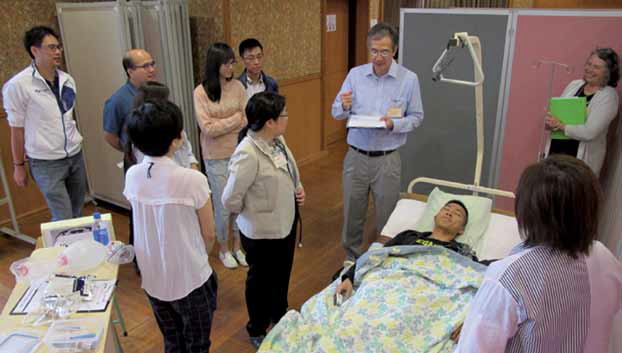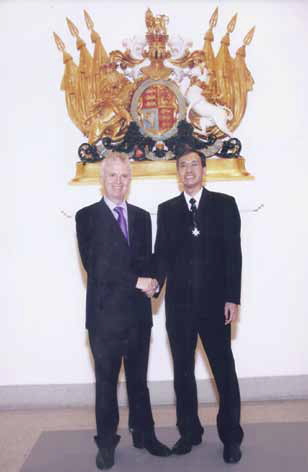© Hong Kong Academy of Medicine. CC BY-NC-ND 4.0
DOCTOR FOR SOCIETY
Bringing emergency care into the community: an interview with Dr Chin-hung Chung
Alison YY Chan, Rex WH Hui
Year 3, Faculty of Medicine, The University of Hong Kong
Having been both an emergency medicine consultant
and hospital chief executive, Dr Chin-hung Chung
has been instrumental in the evolution of emergency
medicine in Hong Kong, and is a renowned pioneer
and leader in the field. The Hong Kong Society for
Emergency Medicine and Surgery, the Hong Kong
College of Emergency Medicine, and the A&E
Training Center at Tang Shiu Kin Hospital were all
established under his leadership.
Outside of his illustrious medical career, Dr
Chung is also a keen advocate of first-aid promotion.
Since 1991, he has been working for the Hong Kong
St John Ambulance and is currently the Director of
the Association, where he takes up administrative,
course development, and teaching duties. A firm
believer in the importance of good prehospital care,
he utilises his expertise as an emergency physician to
introduce advanced and cutting-edge courses to the
organisation. Over the years, he has brought more
than 20 training courses into Hong Kong, including
the Prehospital Trauma Life Support course and the
Advanced Medical Life Support course (through
the China-Hong Kong Chapter of the American
College of Surgeons), to name but a few. To further
promulgate prehospital trauma care, Dr Chung also
translated the 6th edition of the Prehospital Trauma
Life Support course manual in 2008. The translation
of this 600-page textbook took him one and a half
years to complete and the textbook was also used in
Mainland China and Taiwan.
True to the motto of St John Ambulance—“For the Service of Mankind”, Dr Chung incessantly strives to launch projects for the benefit of Hong
Kong citizens. One of his cardinal achievements
was the promotion of public access to automated
external defibrillators (AED) throughout Hong
Kong in 1999. Today, St John Ambulance continues
to regularly hold AED courses for the public, and
knowledge of proper AED usage is a prerequisite for
brigade members of the organisation. Since 2006, Dr
Chung has led mass cardiopulmonary resuscitation
(CPR) training programmes in different areas of
Hong Kong. Particularly worthy of mention is one
that he initiated in January 2010, comprising 5857
participants and breaking the then Guinness World
Record for the largest CPR training session in a day.
Dr Chung spares no effort to extend the
coverage of emergency care to all facets of society.
He envisioned that if local taxi drivers knew first-aid,
Hong Kong people would have access to mobile
and easily available emergency care. Hence, he
implemented and led a pilot project of free CPR
training for taxi drivers in 2011. St John Ambulance
Association also conducts free first-aid talks in
local primary and secondary schools, where first-aid
instructors provide a concise 1-hour lecture to
all enrolled schools. Around 10 000 to 20 000 school
students benefit from this programme annually.
Research is another major area of Dr Chung’s
work, as evidenced by more than 100 articles he
has published. One of his key studies at St John
Ambulance was a randomised trial on CPR teaching
that demonstrated similar CPR performance by
students taught by video self-learning and those
taught in a traditional classroom setting. This
suggests video materials may be an effective and
user-friendly mode of teaching CPR.1 Since its
publication, this paper has been widely recognised
in the academic field and was cited by the American
Heart Association in their latest 2015 guidelines.2
Dr Chung even extends first aid beyond
humans—to dogs and cats. In cooperation with
the Hong Kong Veterinary Association, St John
Ambulance introduced the Pet First Aid course for
pet owners and carers in 2015. The course has been
very popular and oversubscribed, attesting to the
need for first aid for ‘man’s best friends’.
For someone whose work has garnered
such great acclaim, Dr Chung has no thoughts of
slowing down. One of his ongoing ventures involves
advocating compulsory first-aid training for all
local secondary school students. In view of the
recent suicide epidemic in Hong Kong, he is also
working on a counselling programme targeting
schoolchildren, hoping to identify potential suicide
cases before further tragedies occur. On a personal
level, Dr Chung highly cherishes the job satisfaction
and sense of achievement he gains from his work.
Looking ahead, he hopes to carry on with his
duties at the St John Ambulance Association and
continue contributing for the service of mankind
and beyond.
References
1. Chung CH, Siu AY, Po LL, Lam CY, Wong PC. Comparing the effectiveness of video self-instruction versus traditional classroom instruction targeted at cardiopulmonary resuscitation skills for laypersons: a prospective
randomised controlled trial. Hong Kong Med J 2010;16:165-70.
2. Bhanji F, Donoghue AJ, Wolff MS, et al. Part 14: Education: 2015 American Heart Association Guidelines Update
for Cardiopulmonary Resuscitation and Emergency Cardiovascular Care. Circulation 2015;132(18 Suppl 2):S561-73. Crossref



